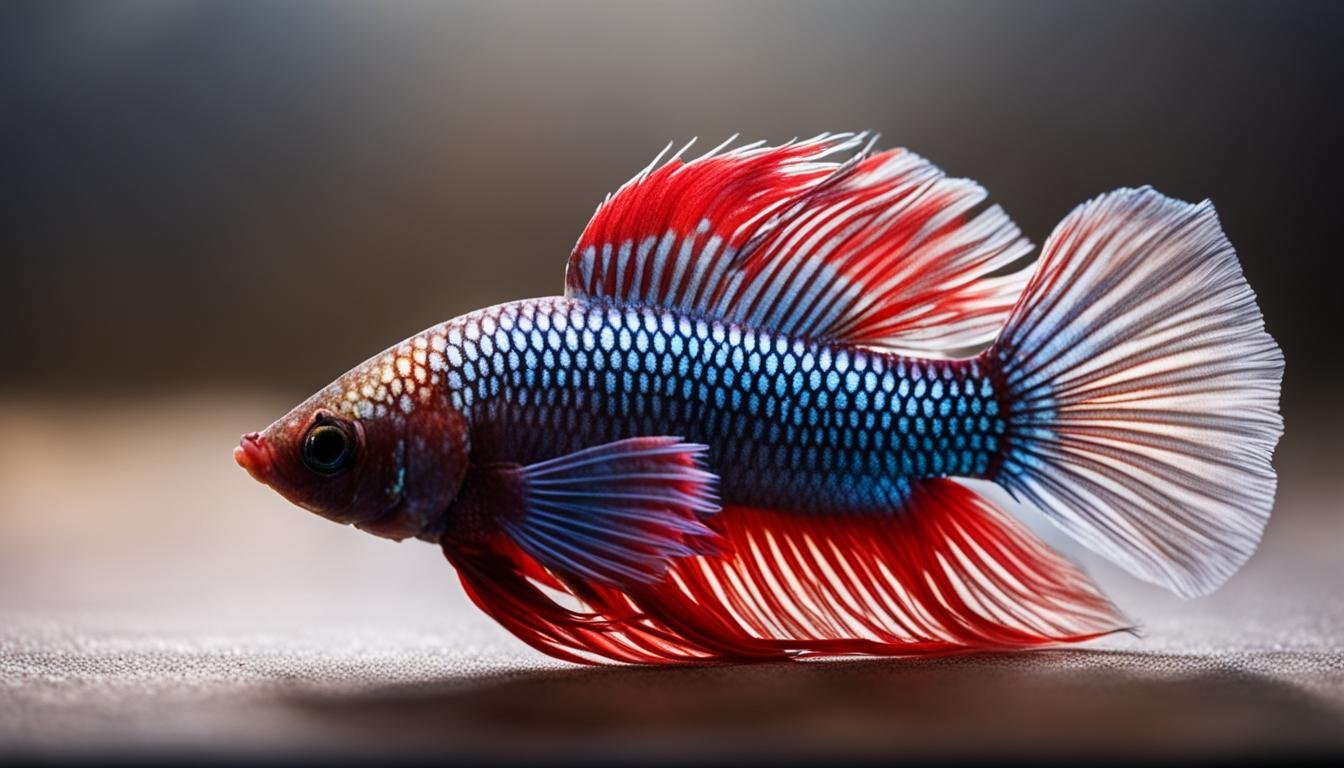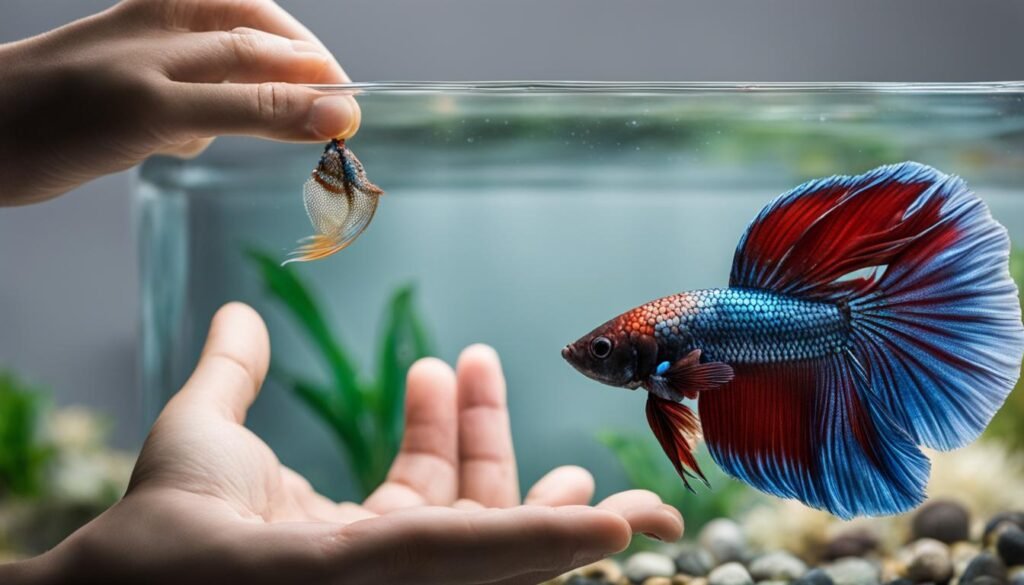Your cart is currently empty!

Unraveling the Mystery: How Long Can A Betta Fish Live Out Of Water?
Betta fish are fascinating creatures known for their unique ability to survive out of water for short periods of time. In this article, we will explore the intricacies of their survival mechanisms and shed light on the factors that affect their ability to breathe outside of their aquatic habitat.
While betta fish are primarily aquatic creatures, they possess a remarkable adaptation called the labyrinth organ. This organ enables them to extract oxygen from the air, allowing them to survive in low-oxygen environments. However, it’s important to note that while betta fish can breathe out of water, they still require a water environment for their overall well-being.
The amount of time a betta fish can survive out of water varies depending on factors such as temperature, humidity, and the individual health of the fish. Generally, they can survive for a few minutes to a couple of hours. It’s crucial to provide proper care and ensure their habitat is suitable for their survival.
Key Takeaways:
- Betta fish have a unique adaptation called the labyrinth organ that allows them to extract oxygen from the air.
- They can survive for a few minutes to a couple of hours out of water, depending on factors like temperature and humidity.
- Extended periods of oxygen deprivation can be distressing and potentially fatal for betta fish.
- Proper care and a suitable aquatic environment are essential for the well-being of betta fish.
- When handling betta fish out of water, it’s important to minimize stress and provide a safe and supportive environment.
How Betta Fish Adapt to Air Breathing
Betta fish have evolved a remarkable adaptation that allows them to breathe air, enabling them to survive in oxygen-deprived environments. This unique ability is made possible by their labyrinth organ, located in their gills. The labyrinth organ serves as a respiratory organ, extracting oxygen directly from the air. This adaptation is crucial for betta fish, especially in their natural habitat, where they often encounter shallow bodies of water with low oxygen levels. In these environments, they may experience periods of drought and rely on air breathing to survive.
When a betta fish breathes air, it helps supplement their oxygen intake from water. Their gills still play a vital role in extracting oxygen when they are submerged, but the ability to extract oxygen from the air allows them to survive in situations where oxygen levels in the water may be insufficient. This adaptation to air breathing is one of the reasons why betta fish can tolerate short periods of time without water.
Can Betta Fish Survive Without Water?
While betta fish can survive for short periods without water, it’s important to note that they still require water for their overall well-being. The duration a betta fish can survive out of water depends on various factors, including temperature, humidity, and the individual fish’s health. Under optimal conditions, betta fish can survive for a few minutes to a couple of hours outside of water.
However, it’s essential to provide proper care and ensure their habitat is suitable for their survival. Keeping a betta fish out of water for extended periods can cause distress and potentially be fatal for the fish. Betta fish are cold-blooded creatures, meaning their body temperature is regulated by their environment. Extreme temperatures can stress them and negatively impact their health. Additionally, betta fish require proper humidity levels to prevent dehydration. Without adequate access to water, they can quickly become dehydrated, leading to further complications.
Betta Fish Gasping for Air
If you observe a betta fish gasping for air at the water’s surface, it can be a sign of low oxygen levels in the water. This behavior is more common when the water is poorly oxygenated or polluted. In these situations, betta fish will instinctively swim to the surface to take in air from the atmosphere. While this behavior is a natural adaptation to low oxygen levels, it indicates that the fish’s environment needs to be addressed. Ensuring proper filtration, aeration, and regular water changes can help maintain optimal oxygen levels and prevent betta fish from gasping for air.
To summarize, betta fish have a remarkable adaptation to air breathing through their labyrinth organ, allowing them to survive in oxygen-deprived environments. While they can tolerate short periods without water, providing them with a suitable aquatic habitat is crucial for their long-term health and well-being. Extreme temperatures and dehydration can be detrimental to their survival. By understanding and addressing their unique needs, we can help betta fish thrive and appreciate their extraordinary ability to adapt.
Factors Affecting Betta Fish Survival Out of Water
When it comes to betta fish, their survival out of water is influenced by several key factors. One of the most critical factors to consider is the duration of time they are exposed to air. While betta fish have the ability to breathe atmospheric air, prolonged periods without water can be distressing and potentially fatal for them. It’s important to minimize the time they spend out of water to ensure their well-being and prevent oxygen deprivation.
Temperature and humidity levels also play a significant role in the survival of betta fish out of water. These cold-blooded creatures rely on their environment to regulate their body temperature. Extreme temperatures can cause stress and negatively impact their overall health. Additionally, betta fish require adequate humidity to prevent dehydration. Without access to water, they can quickly become dehydrated, leading to further complications. Maintaining suitable temperature and humidity levels is essential to ensure their survival when they are temporarily out of water.
Factors Affecting Betta Fish Survival Out of Water:
- Duration of time exposed to air
- Temperature in the surrounding environment
- Humidity levels in the surrounding environment
Monitoring these factors is crucial when handling betta fish out of water. By providing a suitable environment with the right temperature, humidity, and minimal air exposure, betta fish can safely navigate outside of water for short periods. It’s important to prioritize their well-being and prevent any negative effects that may arise from prolonged oxygen deprivation or unsuitable environmental conditions.
How to Safely Handle Betta Fish Out of Water

When it comes to handling betta fish out of water, it’s important to prioritize their well-being and minimize stress. Whether you’re performing routine tank maintenance or transferring them to a new habitat, following proper handling techniques is essential.
Here are some tips for safely handling betta fish out of water:
- Prepare a clean and dry container: Use a separate container to temporarily hold the fish during handling. Ensure that it has been thoroughly cleaned and dried before use.
- Adequate space and support: Choose a container that provides enough space for the fish to move comfortably without causing any damage to their delicate fins. Avoid overcrowding to prevent injuries.
- Minimize disturbance: Betta fish are sensitive creatures, so it’s important to minimize any sudden movements or disturbances that could cause them stress. Keep the environment calm and quiet during the handling process.
- Keep handling time to a minimum: While handling betta fish, it’s crucial to limit the amount of time they spend out of water. The longer they are deprived of water, the more their stress levels increase. Return the fish to its aquatic habitat as soon as the necessary tasks are completed.
Protecting Betta Fish’s Respiratory Function
To ensure the well-being of betta fish during handling, it’s important to maintain their respiratory function. Proper ventilation is crucial to prevent oxygen deprivation. Here are some additional tips:
- Provide adequate ventilation: The container used for handling should have proper ventilation to allow the fish to breathe. This can be achieved by using a container with small holes or a lid with air vents.
- Monitor the fish’s respiration: Keep a close eye on the betta fish during handling to ensure they are breathing properly. Look out for any signs of distress, such as gasping or erratic swimming.
- Handle with care: When moving betta fish from one container to another, do so gently to avoid causing unnecessary stress. Use a soft net or cup to transfer them, taking care not to damage their delicate fins.
By following these guidelines, you can safely handle betta fish out of water while minimizing stress and protecting their respiratory function. Remember, it’s crucial to prioritize the well-being of these unique creatures and provide them with the care they need to thrive.
Conclusion
Betta fish possess remarkable adaptations that allow them to survive out of water for short periods. Their labyrinth organ enables them to extract oxygen from the air, complementing their oxygen intake from water. While betta fish can endure a few minutes to a couple of hours without water, we must prioritize their well-being by providing them with a suitable aquatic environment.
Factors like temperature, humidity, and individual health can influence a betta fish’s survival time out of water. By carefully handling betta fish out of water, minimizing stress, and ensuring their respiratory function is maintained, we can support their unique abilities to breathe outside of water.
Remember, betta fish thrive in their aquatic habitat. By offering them proper care and attention, we allow them to exhibit their extraordinary survival skills. So let’s create an optimal environment for our betta fish, enabling them to flourish and mesmerize us with their distinctive abilities.
FAQ
Can betta fish survive out of water?
Yes, betta fish have the unique ability to breathe air and survive out of water for short periods of time.
How long can betta fish live out of water?
Betta fish can generally survive for a few minutes to a couple of hours out of water, depending on various factors such as temperature, humidity, and individual health.
Why do betta fish need water?
While betta fish can survive out of water, they still require water for their overall well-being. Water provides essential nutrients, oxygen, and a suitable habitat for their survival.
What happens to a betta fish out of water for too long?
If a betta fish is out of water for an extended period, it can experience distress and potentially face fatal consequences due to oxygen deprivation.
How do betta fish breathe air?
Betta fish have a labyrinth organ that allows them to extract oxygen directly from the air. This organ functions as a respiratory organ and enables them to supplement their oxygen intake from water.
How do I handle betta fish out of water safely?
When handling betta fish out of water, use a clean and dry container with enough space for the fish to move comfortably. Minimize stress, avoid sudden movements, and return the fish to its aquatic habitat as soon as possible.
Leave a Reply